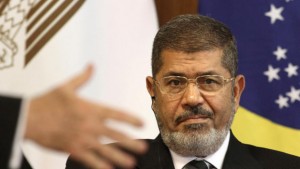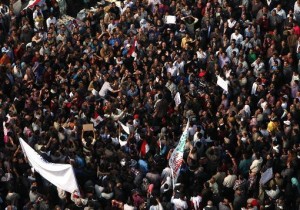Egyptian president, Mohammad Mursi, has vowed there would be no second revolution in Egypt.
In an exclusive interview with the Guardian on the eve of protests, Mursi rejected opposition calls for early presidential elections and said he would not tolerate any deviation from constitutional order. He said that his early resignation would undermine the legitimacy of his successors creating a recipe for unending chaos.
“If we changed someone in office who [was elected] according to constitutional legitimacy well, there will be people or opponents opposing the new president too, and a week or a month later, they will ask him to step down,” Mursi said.
“There is no room for any talk against this constitutional legitimacy. There can be demonstrations and people expressing their opinions. But what’s critical in all this is the adoption and application of the constitution. This is the critical point.”
Despite the pressure, Mursi seems certain of himself and his staying power. Asked if he was confident that the army would never have to step in to control a country that had become ungovernable, Mursi replied: “Very.”

Mursi said the media had taken “small situations of violence and then magnified them as if the whole country is living in violence”. He dismissed the organic nature of the opposition to his rule, and maintained that the fighting had been co-ordinated by “the deep state and the remnants of the old regime” who had paid off hired thugs to attack his supporters in the Muslim Brotherhood.
“They have money, and they got this money from corruption. They used this corrupt money to pull back the regime, and pull back the old regime into power. They pay this corrupt money to thugs, and then violence takes place.”
The president refused to name which countries were meddling in Egypt’s affairs, but maintained that it was happening.
In a rare moment of contrition, Mursi admitted for the first time in the English-language media that he regretted using unilateral powers to force through Egypt’s controversial new constitution a move that the opposition saw as dictatorial. This was the pivotal moment of his first year, sowing the seeds for widespread dissent against his administration.
“It contributed to some kind of misconception in society,” Mursi said, distancing himself from one of the most divisive clauses in the new Islamist-slanted constitution, which allows for greater religious input into Egyptian legislation.
“It’s not me who changed this article. I didn’t interfere in this constitutional committee’s work. Absolutely not.”
The president added that once MPs were finally elected to Egypt’s currently empty lower house of parliamentary, he would personally submit constitutional amendments for debate in the house’s very first session.
But Mursi’s contrition only went so far. Amid opposition claims that the failure to achieve consensus had led to Egypt’s current polarisation, Mursi blamed the refusal of secular politicians to participate in the political process for the impasse. He denied that his government was unduly loaded with Islamists. He went on to list numerous offers he claimed he had made to bring non-Islamists on board, while simultaneously defending the right of a popularly-elected president to promote his allies. “This is the concept of real democracy,” he said.
Asked why he had repeatedly refused to criticise specific instances of police malpractice, the president claimed that his praise was meant in a more general sense. “When I say I am supporting the police or the army, I am talking about the army in general and the police in general. In general, those institutions are good institutions. Accordingly if there are certain violations, or crimes, or abuses by certain individuals well, the law takes its course.”
On Sunday, anti-Mursi protesters gathered outside the presidential palace in their thousands, asking for the president’s resignation. The protests remain peaceful as pro-Mursi Egyptians gathered at the city of Nasr. Some anti-Mursi protesters were also seen in Alexandria.
Mursi in a statement through presidential spokesman, Ihab Fahmi urged the protesters to remain peaceful, and called for a peaceful resolution and dialogue to the grievances of parties involved.





